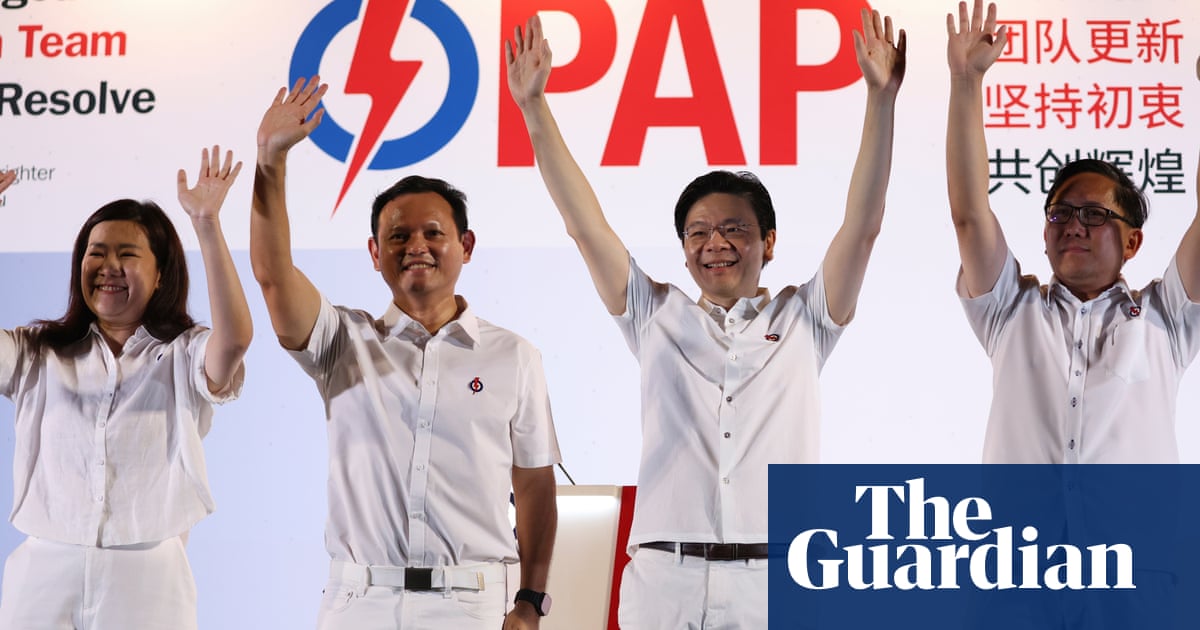Singapore’s ruling party has notched a resounding win in general elections, official results showed early Sunday, giving prime minister Lawrence Wong the clear mandate he sought from voters.
Wong’s long-ruling People’s Action party crossed the threshold of 49 seats to form a majority government in the wealthy city-state’s 97-seat unicameral legislature, with sample counts earlier showing the PAP winning all but 10 seats.
“We are grateful once again for your strong mandate, and we will honour it,” a broadly smiling Wong said shortly after winning his ward, thanking supporters gathered at Yio Chu Kang stadium.
Wong was facing his first major test against a rejuvenated opposition and had urged voters to offer him a strong show of support as he navigates the trade-oriented nation through global economic uncertainties brought by US tariffs.
The PAP, which has steered the Southeast Asian country to prosperity while being criticised for suppressing dissent, was always expected to easily retain a clear majority in the legislature.
However, its dominance has been increasingly challenged by a more vocal electorate over the years.
Popular after leading Singapore’s Covid task force, Wong took over last year from his predecessor Lee Hsien Loong, the son of founding premier Lee Kuan Yew who ruled the island state after its bitter breakup with Malaysia in 1965.
Wong had warned Singapore would be hit hard if US President Donald Trump went ahead with the tariffs he announced and then paused for most countries, and that it needed to stay open and competitive to counter their effects.
He has also said the ructions caused could require a major restructuring of Singapore’s economy.
“The intense campaigning by PM Lawrence Wong and former PM Lee Hsien Loong in the hot seats must have helped a lot and the fear of Trump’s tariffs must have worried voters as well,” political observer and veteran former editor PN Balji told AFP.
The overwhelming PAP majority has become a norm in Singapore’s political landscape.
But in the runup to the latest polls, the PAP had faced a series of controversies.
Lee Hsien Loong is locked in a bitter feud with his brother Lee Hsien Yang, who vehemently supports the opposition and who has sought political asylum in Britain.
The long-running family row centres on allegations made by Lee Hsien Yang that his brother is seeking to block the demolition of a family bungalow to capitalise on Lee Kuan Yew’s legacy - something he has denied.
Last year, former transport minister S Iswaran was thrown in jail for graft, and in 2023 the parliament speaker and a lawmaker resigned over an “inappropriate” affair.
At the same time, younger voters showed themselves to be increasingly receptive to alternative political voices.
One voter told AFP she had been impressed by “refreshing and exciting” new candidates from across the political spectrum.
“Whether or not they get elected, I hope we see and hear more of them, and get to know them better,” said 40-year-old Shi’ai Liang.
In 2020, the country’s largest opposition group, the Workers’ party (WP), made historic gains, winning 10 of the 93 seats at stake – a significant jump from its previously held four seats.
The WP – which has become politically slicker – had been hoping to build on that momentum with a slate of charismatic candidates, including a top lawyer.
The party pulled in massive crowds at its rallies during the campaign, just like in previous elections, but those big numbers have seldom translated into electoral wins in the past.
Campaigning on cost of living issues, WP candidates said more opposition MPs were needed to deprive the PAP of a political “blank cheque” to do whatever it wants.
The PAP, however, pointed to the billions of Singapore dollars it has spent in helping citizens cope with rising costs, including via cash handouts and grocery vouchers.
